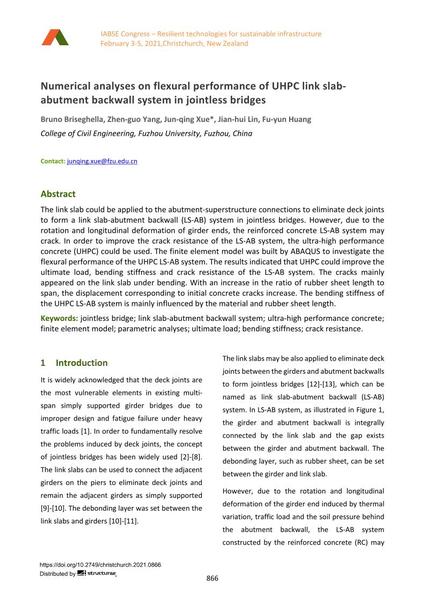Numerical analyses on flexural performance of UHPC link slab- abutment backwall system in jointless bridges

|
|
|||||||||||
Détails bibliographiques
| Auteur(s): |
Bruno Briseghella
Zhen-Guo Yang (College of Civil Engineering, Fuzhou University, Fuzhou, China) Jun-Qing Xue (College of Civil Engineering, Fuzhou University, Fuzhou, China) Jian-hui Lin (College of Civil Engineering, Fuzhou University, Fuzhou, China) Fu-yun Huang (College of Civil Engineering, Fuzhou University, Fuzhou, China) |
||||
|---|---|---|---|---|---|
| Médium: | papier de conférence | ||||
| Langue(s): | anglais | ||||
| Conférence: | IABSE Congress: Resilient technologies for sustainable infrastructure, Christchurch, New Zealand, 3-5 February 2021 | ||||
| Publié dans: | IABSE Congress Christchurch 2020 | ||||
|
|||||
| Page(s): | 866-873 | ||||
| Nombre total de pages (du PDF): | 8 | ||||
| DOI: | 10.2749/christchurch.2021.0866 | ||||
| Abstrait: |
The link slab could be applied to the abutment-superstructure connections to eliminate deck joints to form a link slab-abutment backwall (LS-AB) system in jointless bridges. However, due to the rotation and longitudinal deformation of girder ends, the reinforced concrete LS-AB system may crack. In order to improve the crack resistance of the LS-AB system, the ultra-high performance concrete (UHPC) could be used. The finite element model was built by ABAQUS to investigate the flexural performance of the UHPC LS-AB system. The results indicated that UHPC could improve the ultimate load, bending stiffness and crack resistance of the LS-AB system. The cracks mainly appeared on the link slab under bending. With an increase in the ratio of rubber sheet length to span, the displacement corresponding to initial concrete cracks increase. The bending stiffness of the UHPC LS-AB system is mainly influenced by the material and rubber sheet length. |
||||
